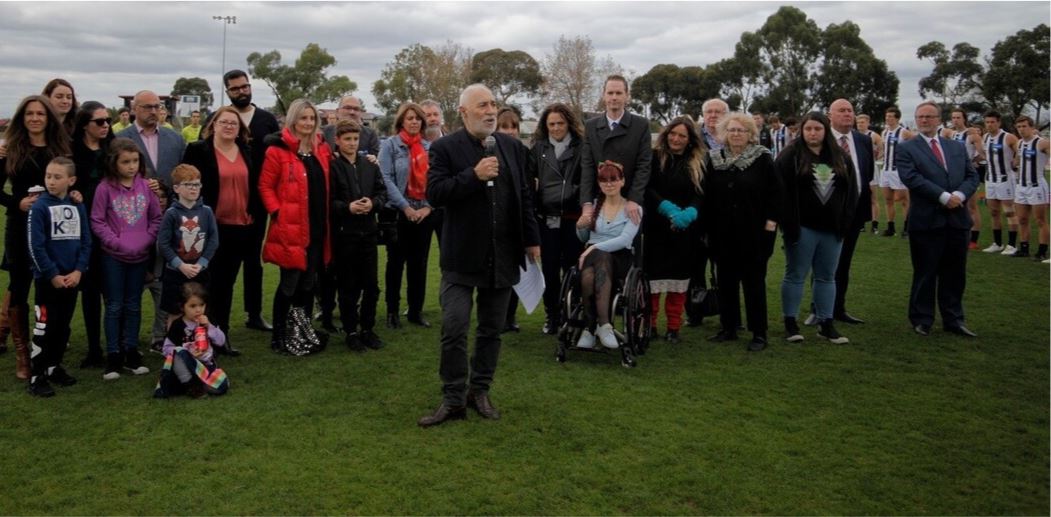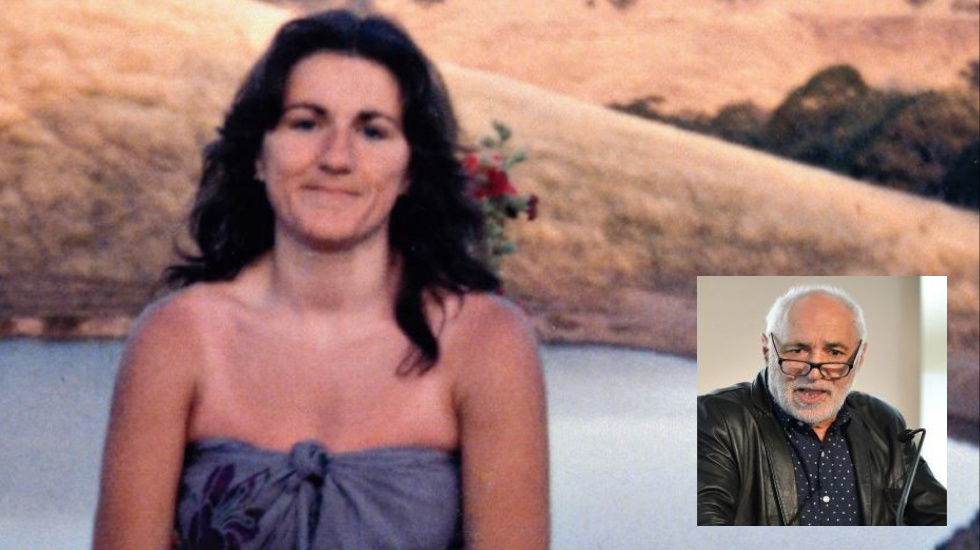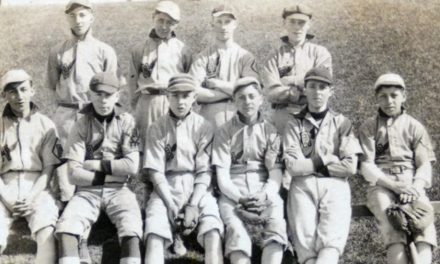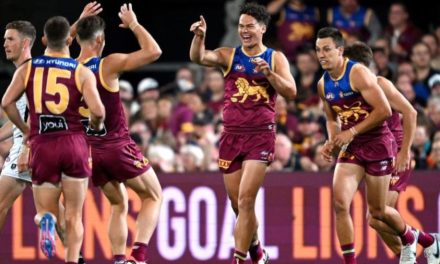Vicki Cleary’s murderer was able to downgrade his charge to manslaughter. (Inset): Vicki’s brother Phil Cleary.
Saturday marks the fifth annual Vicki Cleary Day, a day to remember women lost to men’s violence and to spark conversations that help eradicate the attitudes which lead to it.
The day will be marked with an event at Coburg City Oval, organised by former Federal parliamentarian and Coburg VFA premiership star and coach Phil Cleary, who has been campaigning for legal and social change around men’s violence since the murder of his sister, Vicki, in 1987.
This year will be particularly significant, as among the guests will be Jane Ashton, whose twin sister Julie Ramage was murdered by her husband 20 years ago.
The case of Julie’s murder was the last of its kind in Victoria. That is, the last case that used the “provocation defence”, where the accused can argue that their victim had engaged in provocative conduct to such an extent that any ordinary person could act as they did. In the history of men’s violence cases, it has been used to downgrade homicide charges.
Thanks to the dogged campaigning of people whose lives had been ripped apart by similarly devastating circumstances, the Law Reform Commission agreed in 2004 that the provocation defence in homicide cases should be abolished.
In the time between this recommendation being formalised and the Victorian parliament enshrining it in law, Julie Ramage’s killer was tried and, using the provocation defence, sentenced to the lesser charge of manslaughter. The community was outraged.
But the devastating outcomes made possible by the provocation defence were already well-known to Phil when this case gained his attention. In the trial following Vicki’s murder, her killer had used the provocation defence and successfully also downgraded his charge to manslaughter. Another court case around the same time, regarding the murder of a woman named Christine Boyce, produced a similar outcome.
Phil’s life of activism was begun.
“These murders triggered my campaign,” he tells Footyology. “Vicki’s murder was always going to have an impact on me, but the Christine Boyce murder impacted me in that I saw another case that followed Vicki’s that was so similar, and that sent me in search of the origins of this law. I concluded with years of research that this law had a shocking history.”
Having had a university education and exposure to second wave feminist concepts, Cleary researched the provocation law through a critical eye with a view that it may come into play in Vicki’s case.
“When I went to court and I saw it unravel, I was more astounded than I thought I could ever be. It was a truly brutal concept. It was an affront to everything I believed about human rights and the rights of women.”

Phil Cleary addresses people attending last year’s Vicki Cleary Day.
“There I am with that academic background, watching a law manifest in a courtroom that seemed to be totally at odds with the rights of women, and was doing to women what (Germaine) Greer and (Kate) Millet and so many other feminists were saying that society was doing to women. From that moment on I realised that I had to campaign, and I did immediately.”
Cleary began to write opinion pieces in The Age newspaper. He spoke on TV and radio, and he also spoke to lawyers and experts. It became clear that there was a link between discriminatory notions of ownership, and how this concept was being interpreted by the courts.
“My argument is that the provocation law was founded on the patriarchal tenet that a woman was a man’s property. It wasn’t just the law that was the problem, it was the society that was also guilty. Because what you saw in courtrooms was juries giving expression to notions of patriarchy and deeply held misogynistic views.”
When campaigning, then and now, he speaks not only of the devastating effects of violence, but of the destructive impact of language on what a society is willing to accept. He highlights common phrases used to describe violence against women and how they fall so far short of the mark.
“Historically we’ve had a narrative that’s camouflaged the real nature of men’s violence against women. So often we’ve used language that sanitised the nature of the act,” he says.
“A ‘domestic dispute.’ ‘An argument.’ ‘A fight.’ A woman attacked by a man is not engaged in a fight with a man. Two men punching on outside a nightclub are engaged in a fight. A woman who is set upon by a man is the victim of a man’s violence and aggression. But we’ve tended to use language everywhere that camouflages the nature of that violence. And the provocation defence was full of that.”
In 2005, the provocation defence was abolished for good. But Phil’s work continued. As part of the inaugural Victorian government Victim Survivors Advisory Council working on the Family Violence Reform Agenda, the path forward for organisations wanting to make meaningful change in this space was crystalised.
“What is the place of people with lived experience? I say society must talk to people with lived experience,” he says. “In my case, my family didn’t just live with one man’s violent act. We lived with a court case that belittled my sister. That saw her blamed for that man’s brutal act of revenge.”
PLEASE HELP US CONTINUE TO THRIVE BY BECOMING AN OFFICIAL FOOTYOLOGY PATRON. JUST CLICK THIS LINK.
He worked with other people on the council who had experienced and survived similar atrocities, and who had also dedicated their lives to the issue.
“What those bodies out there need to do is not just talk to the bureaucrats. Don’t just talk to heads of organisations. You have to talk to key people in the community who are engaged in the campaign. We’ve got to be your number one port of call.”
“We don’t just campaign in some haphazard way. We’re informed, we research. We’ve been thinking about these questions in a comprehensive way. We need to be talked to.”
Phil has taken his message all over the country, but community sporting organisations are seen as one of the front lines. And things are undoubtedly improving. The issue of men’s violence against women is no longer a fringe one, which means that conversations are taking place in a more mainstream setting.
The Carlton Respects game, held at Docklands last Friday night, is an example of that. Commencing in 2016, the game is part of a broader program run by the Carlton Football Club that engages schools and workplaces on the importance of respect and equality. Cleary was in attendance on Friday at the invitation of the club and spoke both before the game and at half-time.
“We’ve got reason to think that we can continue to improve men’s understanding of the question, and get to a point where we end the violence that’s caused by men’s patriarchal, misogynistic, discriminatory attitudes towards women,” he says.
“Everywhere you look, people are talking. In schools, in sporting clubs, in the community. And you don’t solve a problem until you acknowledge you have one and you talk about it. So we’re doing it. Carlton Respects is an example of us talking about the problem.”
Nonetheless, he felt that the event could have been showcased in a far more impactful way by both the broadcasters and the AFL.
“It’s great to have a club (involved), it’s great that they’ve embraced the question. But these are opportunities we shouldn’t miss. We need to let every kid out there know that violence against women is real. We need to say in the broadcast that violence against women claims 60 women a year.
“We need to say that on the ground today are a number of people who are the brothers and sisters of murdered women. And on the ground today are other women who’ve endured violence at the hands of men they’ve known. That message – stark, brutal –- should appear in the broadcast of a big game of football.”

Phil Cleary in action for VFA side Coburg, with whom he played in and coached premierships.
And while Cleary’s relationship with Carlton remains ongoing, other engagements at the elite level of football have been few and far between.
If there’s a message to clubs, both at the professional and local level, it’s that they must look at addressing underlying attitudes towards women, as opposed to the behaviour that results from those attitudes.
“The discussion we have about men accused of disrespectful –- or what I might call patriarchal –- behaviour needs to be better at AFL level. And it will only be better when our coaches or the people who are speaking on behalf of the club fully understand the nature of the problem. Not talking simply about a man’s behaviour, but articulating what is it about the man’s behaviour that might have some people thinking it belongs in some antiquated patriarchal world.”
Once again, bringing people with real experience is the approach that Cleary wishes to highlight. Though it isn’t necessarily their bread and butter, he believes that coaches should be equipped to navigate these situations through talking to people who’ve lived it.
He also sees the increased involvement of women in sporting clubs at all levels as a significant driver of change.
“I believe that football clubs and sporting clubs are the place to be, especially because they now have women’s teams in them. It’s incumbent on the administration to explore the question of respectful relationships. We can walk young footballers through the notion of how disrespectful language and jokes about women are part of the problem and have to be stopped.
“Every local club needs women in positions of authority. Coaching teams, articulating policy, engaged in discussion about what the values of a club are. Young boys need to see women in non-traditional roles.”
On Saturday, Vicki Cleary Day will not only mourn the loss of many women who have been victims of men’s violence, it will also celebrate the achievements of women in policy, sport, and society in general. In addition to speakers who’ve lost loved ones to violence, the event will also feature Claire Wright OAM, an historian and professor who will deliver an address on the significant things women have achieved in history and in public life.
The match itself, between Cleary’s old VFA mob Coburg and the Northern Bullants (formerly Preston), also carries significance.
“In 1973, Coburg played Preston in the relegation game, two years before I started,” he recalls. It drew a full house … Coburg lost and was relegated (to second division). The Coburg football ground had the Mark Jackson circus on display in 1986 with a full house. Wouldn’t it be great if we could get a big crowd to this profound and important day that doesn’t just remember Vicki, but remembers all the women taken.”
To donate to the Vicki Cleary Day fund, visit
FAMILY AND DOMESTIC VIOLENCE SUPPORT
1800 Respect national helpline: 1800 737 732
Women’s Crisis Line: 1800 811 811
Men’s Referral Service: 1300 766 491












Thank you, Phil, for keeping the terrible event that happened to Vicki in people’s minds, reminding them how far we can come and how far we still have to go.